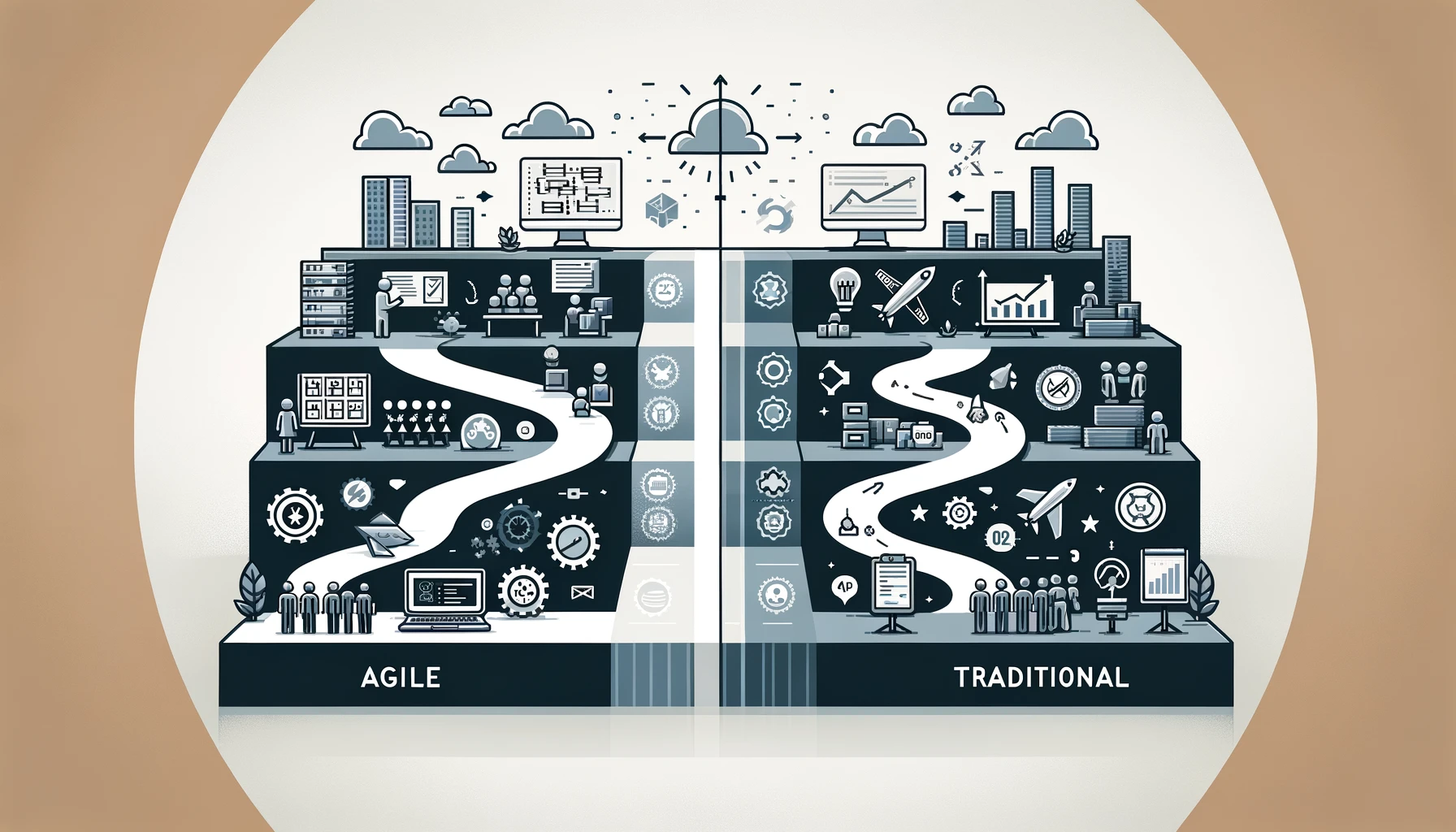Introduction
In the ever-evolving landscape of project management, a crucial decision looms for aspiring and seasoned professionals alike: choosing between Agile and traditional project management careers. This choice isn’t just about methodologies; it’s about aligning your career path with your skills, personality, and the demands of the modern workplace.
Let’s embark on a journey through the realms of Agile and traditional project management, exploring the nuances that could shape your professional future. Whether you’re drawn to the structured approach of Waterfall or the flexibility of Scrum, this guide will help you navigate the crossroads of your project management career.
Understanding the Basics: Agile vs Traditional Project Management Careers
At its core, the choice between Agile and traditional project management is about how you approach project planning, execution, and delivery. Let’s break down these two methodologies:
Traditional Project Management:
- Also known as Waterfall methodology
- Linear, sequential approach
- Relies on a detailed project plan created upfront
- Less flexible to changes throughout the project lifecycle
- Often used in industries with well-defined project requirements
Agile Project Management:
- Iterative, incremental approach
- Adaptive to changing project requirements
- Focuses on continuous feedback and improvement
- Often utilizes frameworks like Scrum or Kanban
- Popular in software development and industries with evolving project scopes
Understanding these fundamental differences is crucial in deciding which project management career path aligns best with your work style and career aspirations.
Traditional Project Management Careers: The Structured Approach
Opting for a career in traditional project management is like choosing a well-mapped route for a journey. It offers clarity, structure, and a sense of predictability.
Key Characteristics of Traditional PM Careers:
- Structured Progression: Clear career ladder from project coordinator to project manager to program manager
- Industry Versatility: Applicable across various sectors like construction, manufacturing, and government
- Certification Focus: Emphasis on certifications like PMP (Project Management Professional)
- Long-term Planning: Suits professionals who excel at creating detailed project plans
Popular Traditional PM Job Roles:
- Project Coordinator
- Project Manager
- Program Manager
- Portfolio Manager
Advantages of Choosing a Traditional PM Career:
- Established methodologies and tools for risk management
- Clear project phases and milestones
- Suits detail-oriented individuals who prefer predictive approaches
- Valuable in industries with regulatory requirements or fixed project scopes
Challenges to Consider:
- Can be less flexible in fast-changing environments
- May feel bureaucratic in some organizations
- Potentially slower to adapt to market changes or evolving project requirements
Agile Project Management Careers: Embracing Flexibility
Stepping into an Agile project management career is like joining a dynamic, ever-changing landscape. It’s all about adaptability, collaboration, and rapid iteration.
Key Characteristics of Agile PM Careers:
- Adaptive Skillset: Focus on flexibility, team collaboration, and interactive releases throughout a project
- Tech Industry Prominence: Particularly popular in Agile software development and IT sectors
- Continuous Learning: Emphasis on ongoing skill development and adaptation to new Agile frameworks
- Short-term Planning: Suits professionals who thrive in fast-paced, changing environments
Popular Agile PM Job Roles:
- Scrum Master
- Agile Coach
- Product Owner
- Agile Project Manager
Advantages of Choosing an Agile PM Career:
- High demand in tech and innovation-driven industries
- Encourages creativity and problem-solving within the project team
- Often associated with modern, forward-thinking companies
- Suited for professionals who enjoy variety and adapting to change
Challenges to Consider:
- Can be challenging to implement in traditional or highly regulated industries
- May require more emphasis on soft skills and people management
- Potentially less structured career progression compared to traditional PM roles
The Hybrid Approach: Bridging Agile and Traditional Methodologies
What if you’re intrigued by aspects of both Agile and traditional project management? Enter the hybrid approach – a methodology that combines elements from both worlds to create a flexible yet structured project management framework.
Characteristics of Hybrid PM Careers:
- Methodology Fluency: Understanding of both Agile and traditional methods
- Adaptability: Ability to switch between approaches based on specific project needs
- Broad Applicability: Suitable for organizations in transition or with diverse project types
- Balanced Skillset: Combines detailed planning with flexibility and adaptability
Benefits of a Hybrid PM Career:
- Versatility across different projects and industries
- Ability to tailor approaches to ensure project success in various contexts
- Valuable in organizations transitioning from traditional to Agile methods
- Potential for unique, high-level strategic roles in project management
Making Your Choice: Factors to Consider
Deciding between Agile, traditional, or hybrid project management careers isn’t just about the methodologies – it’s about finding the right fit for your skills, personality, and career goals. Here are some factors to consider:
- Your Work Style: Do you prefer a predictive approach with a detailed project plan, or do you thrive in an adaptive environment?
- Industry Preferences: Research which industries typically use Agile vs traditional methods. Where do you see yourself making the most impact?
- Career Aspirations: Consider the long-term career paths in each approach. Which aligns better with your professional goals?
- Work Environment: Think about the type of project team dynamics you prefer. Agile often correlates with more collaborative, fast-paced environments.
- Skill Set: Assess your current skills and those you’re eager to develop. Which methodology better matches your strengths and learning goals?
- Market Demand: Research job markets in your area. Is there higher demand for Agile project managers or those versed in traditional methodologies?
- Project Types: Consider the kinds of projects you enjoy. Do you prefer projects with well-defined scopes or those that evolve over time?
Your Next Steps: Charting Your PM Career Course
Ready to embark on your project management career journey? Here’s how to get started:
- Research and Reflect: Dive deeper into each methodology. Reflect on which aspects of project management resonate with you most.
- Skill Assessment: Evaluate your current skills and identify areas for development in your chosen path, whether it’s risk management for traditional PM or Agile frameworks for an Agile career.
- Network: Connect with professionals in both Agile and traditional PM roles. Their insights can be invaluable in understanding the day-to-day realities of each career path.
- Training and Certification: Look into relevant certifications or training programs for your chosen path, such as PMP for traditional or Scrum Master certifications for Agile.
- Gain Experience: Seek internships, volunteer opportunities, or entry-level positions to get hands-on experience in your preferred project management approach.
- Stay Flexible: Remember, your initial choice isn’t set in stone. Many project managers switch between or combine methodologies throughout their careers to adapt to different project needs.
Conclusion: Your Unique PM Journey Awaits
Choosing between Agile and traditional project management careers isn’t about finding the “best” methodology – it’s about discovering the approach that aligns with your strengths, goals, and the types of projects you want to lead. Whether you’re drawn to the structured phases of traditional project management, excited by the dynamic nature of Agile methodologies, or intrigued by a hybrid approach, there’s a place for you in the diverse world of project management.
Remember, successful project managers often borrow techniques from various methodologies to ensure project success. The skills you develop in either path will be valuable, and there’s always room to adapt and grow as your career progresses and project management continues to evolve.
Ready to take the next step in your project management journey? At Project Success Hub, we’re here to support you every step of the way. Check out our Project Management Career Assessment Tool to gain personalized insights into which PM path might be right for you. Your exciting career in project management starts now – are you ready to make your mark and lead projects to success?






0 Comments